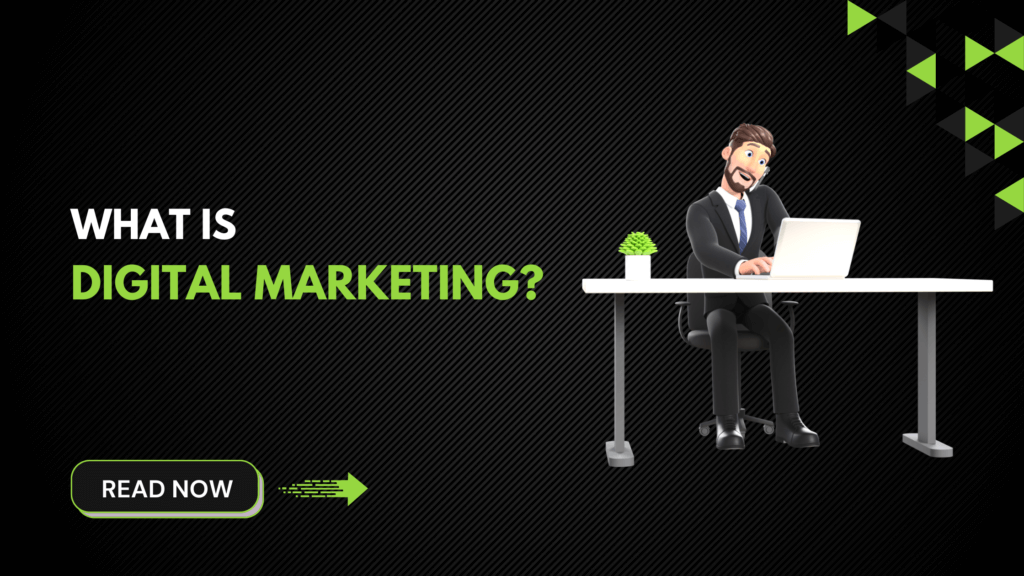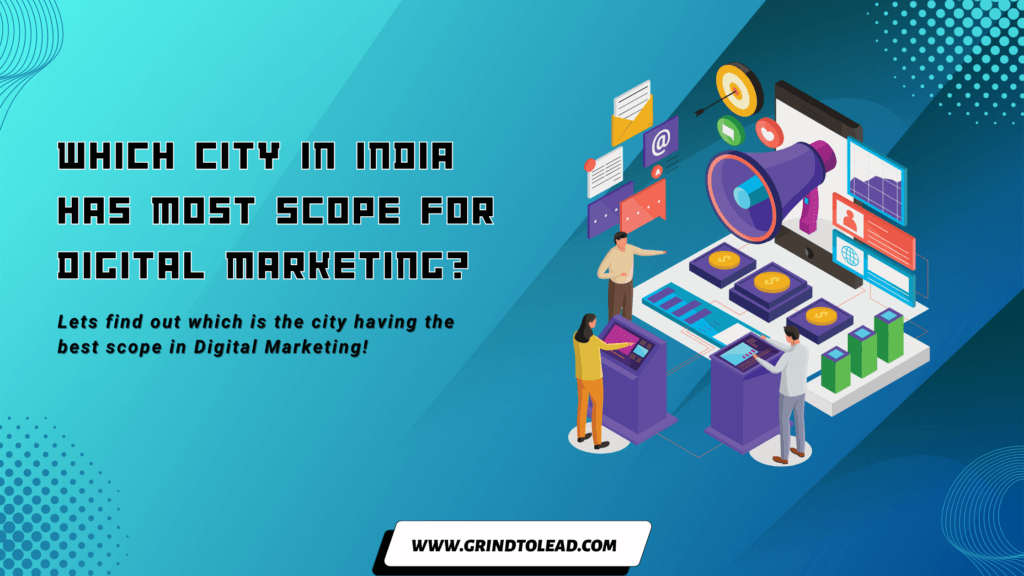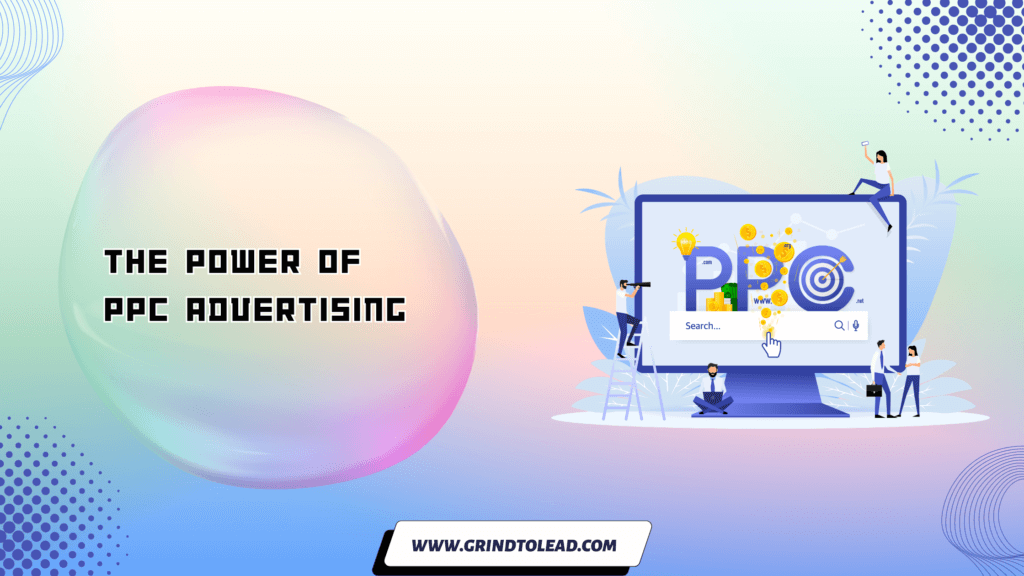What is Digital Marketing?

In today’s digital age, where technology dominates every aspect of our lives, traditional marketing methods are becoming obsolete, paving the way for digital marketing to take center stage. But what exactly is digital marketing? Introduction to Digital Marketing Digital marketing encompasses a broad range of online marketing activities aimed at promoting products or services through various digital channels. It leverages the internet and electronic devices such as computers, smartphones, tablets, and social media platforms to reach and engage with target audiences. Unlike traditional marketing methods, digital marketing allows for precise targeting, real-time interaction, and comprehensive analytics, making it a dynamic and essential component of modern marketing strategies. Understanding Digital Marketing Channels Digital marketing operates through multiple channels, each serving a distinct purpose in reaching and engaging audiences. These channels include: Search Engine Optimization (SEO) SEO is the process of optimizing your website and its content to rank higher in search engine results pages (SERPs) for relevant keywords and phrases. It involves various techniques such as keyword research, on-page optimization, link building, and technical optimization. By improving your website’s visibility in search engines like Google, you can attract organic traffic and increase brand awareness. One of the key benefits of SEO is its long-term sustainability. Unlike paid advertising, which requires ongoing investment, SEO can deliver consistent results over time with proper maintenance and optimization. Additionally, SEO allows you to target specific keywords and phrases relevant to your business, ensuring that you attract highly qualified leads who are actively searching for your products or services. Social Media Marketing (SMM) SMM involves leveraging social media platforms such as Facebook, Instagram, Twitter, and LinkedIn to promote your brand, engage with your audience, and drive traffic to your website. Social media provides a unique opportunity to connect with customers on a personal level, build relationships, and foster brand loyalty.One of the key advantages of social media marketing is its ability to reach a vast audience quickly and cost-effectively. With billions of active users on social media platforms worldwide, businesses can target their ideal customers based on demographics, interests, and behaviors. Additionally, social media allows for real-time communication and feedback, enabling businesses to respond to customer inquiries, address concerns, and provide support promptly. Email Marketing Email marketing involves sending targeted emails to prospects and customers with the aim of nurturing leads, promoting products or services, and driving conversions. Email remains one of the most effective channels for engaging with customers and driving sales, with an average return on investment (ROI) of $42 for every $1 spent. One of the key advantages of email marketing is its ability to deliver personalized and relevant content directly to the inbox of your target audience. By segmenting your email list based on demographics, preferences, and behaviors, you can tailor your messages to resonate with each recipient, increasing the likelihood of conversion. Additionally, email marketing allows for automation, enabling businesses to send automated campaigns based on triggers such as website activity, purchases, or birthdays. Content Marketing Content marketing involves creating and distributing valuable, relevant, and consistent content to attract and retain a clearly defined audience and ultimately drive profitable customer action. Content can take many forms, including blog posts, articles, videos, infographics, podcasts, and more. The key is to provide content that educates, entertains, or inspires your audience, positioning your brand as a trusted authority in your industry. One of the key benefits of content marketing is its ability to build brand awareness and credibility. By consistently producing high-quality content that addresses the needs and interests of your target audience, you can establish your brand as a thought leader in your niche, earning the trust and loyalty of your customers. Additionally, content marketing can help drive organic traffic to your website, improve search engine rankings, and generate leads over time. Pay-Per-Click Advertising (PPC) PPC advertising involves placing ads on search engines like Google or social media platforms like Facebook and paying a fee each time someone clicks on your ad. PPC allows businesses to reach their target audience quickly and efficiently, driving traffic to their website and generating leads or sales. One of the key advantages of PPC advertising is its immediacy and precision. Unlike organic methods like SEO, which can take time to see results, PPC allows you to target specific keywords and demographics instantly, ensuring that your ads are seen by the right people at the right time. Additionally, PPC provides valuable insights into keyword performance, ad copy effectiveness, and audience behavior, enabling businesses to optimize their campaigns for maximum ROI. Importance of Digital Marketing In today’s digital-centric world, the importance of digital marketing cannot be overstated. It offers businesses of all sizes numerous benefits, including increased brand awareness, expanded reach, improved customer engagement, and higher conversion rates. Digital marketing enables companies to connect with potential customers at every stage of the buying journey, from initial research to final purchase decision. Additionally, it provides valuable insights into consumer behavior and preferences, allowing businesses to tailor their marketing efforts for maximum effectiveness. Overall, digital marketing plays a pivotal role in driving business growth and staying competitive in the digital landscape. Benefits of Digital Marketing Some key benefits of digital marketing include: Digital Marketing Strategies To succeed in digital marketing, businesses need to implement effective strategies tailored to their specific goals and target audience. These strategies include: Setting SMART Goals SMART goals are Specific, Measurable, Achievable, Relevant, and Time-bound. By setting clear objectives, businesses can track their progress and measure the success of their digital marketing efforts. Target Audience Identification Understanding your target audience is crucial for creating relevant and engaging content and delivering personalized marketing messages that resonate with your audience. Content Creation and Distribution Creating high-quality content that provides value to your audience is key to attracting and retaining customers. Distributing this content through various channels ensures maximum reach and engagement. Performance Tracking and Analytics Tracking key performance indicators (KPIs) and analyzing data allows businesses to measure the effectiveness of their digital marketing campaigns and make informed decisions
Which City In India Has Most Scope For Digital Marketing?

The clear answer is Mumbai. Mumbai is the city in India that has the most scope for Digital Marketing.Mumbai is unquestionably one of the top places to consider when it comes to the reach of digital marketing in India. Mumbai, India’s financial centre, is a flourishing metropolis with several chances for digital marketers. In today’s digital world, digital marketing has become an essential component of corporate strategies. Businesses are utilising a variety of internet channels to reach their target audience and market their products or services. With its vast population and rising internet penetration, India presents enormous prospects for digital marketing. However, many locations in India stand out as digital marketing hotspots for a variety of reasons, including infrastructure, talent pool, market demand, and business ecology. In this post, we will investigate and examine the cities in India that provide the biggest opportunities for digital marketing. Introduction Search engine optimisation (SEO), social media marketing, content marketing, email marketing, and other activities fall within the purview of digital marketing. Demand for digital marketing services is rising as firms see the value of having a digital presence. India is a rich field for digital marketing experts and firms due to its large population and fast increasing digital ecosystem. The Digital Marketing Landscape in India In recent years, India’s digital marketing business has grown significantly. Factors such as the government’s Digital India plan, rising smartphone penetration, low-cost internet connection, and the advent of e-commerce have all fueled demand for digital marketing services. As a result, several cities in India have emerged as hubs for digital marketing activity. So lets discuss the main emerging cities in India in the field of Digital Marketing. Mumbai: The Financial and Digital Capital Mumbai, India’s financial hub and the “City of Dreams,” has developed as a key centre for digital marketing. The city’s robust business ecosystem, along with access to top-tier talent, positions it as a digital marketing hotspot. Many international firms, startups, and advertising agencies in Mumbai use digital marketing to reach their target audience. The presence of the Bollywood sector expands digital marketing prospects in Mumbai by combining entertainment and marketing in an innovative way. The vibrant atmosphere, bustling marketplaces, and diverse population of the city make it a perfect location for businesses to engage with their clients via digital media. Bengaluru: The Silicon Valley of India Bengaluru, often known as India’s Silicon Valley, is well-known for its technical strength and creativity. The city has a strong IT infrastructure, a thriving startup scene, and a pool of highly trained workers. The digital marketing environment in Bengaluru is growing, with various digital marketing agencies, IT organisations, and startups working in the city. The city’s status as a digital marketing hotspot is aided by a supportive environment, the availability of venture capital, and the presence of major educational institutions such as the Indian Institute of Management (IIM) as well as the Indian Institute of Science (IISc). Bengaluru is a creative and technological melting pot that offers limitless potential for digital marketers to succeed. Delhi: The Hub of Digital Innovation Delhi, India’s capital city, is not only a political and cultural centre, but also a notable centre for digital innovation. The city is home to a large number of digital marketing firms, e-commerce businesses, and technological startups. Delhi’s strategic location in the centre of North India, along with its broad consumer market, makes it a great site for digital marketing efforts. The entrepreneurial spirit of the city, along with a favourable business climate, stimulates innovation and growth in the digital marketing sector. With its mix of old enterprises and rising startups, Delhi provides a unique environment for digital marketers to explore and enter new markets. Hyderabad: The Rising Tech Hub Hyderabad, sometimes known as “Cyberabad,” has seen remarkable expansion in the technology industry, drawing large IT firms and startups. The city’s prominence as an emerging tech powerhouse has also generated demand for digital marketing services. With its low cost of living and sturdy infrastructure, Hyderabad provides a favourable business climate. It is home to various technology parks and incubation centres that help digital marketing businesses thrive. Furthermore, the city’s rich cultural past and welcoming atmosphere make it an enticing location for businesses looking to build a digital presence and connect with a tech-savvy audience. Chennai: The Emerging Digital Marketing Destination Chennai, Tamil Nadu’s capital, is quickly growing as a significant digital marketing location. The city’s significant presence in areas like as information technology, healthcare, manufacturing, and automotive contributes to the need for digital marketing services. Chennai’s developing startup environment and skill pool make it an appealing destination for digital marketing ventures. Educational institutions in the city, such as the Indian Institute of Technology (IIT) Madras and Anna University, create qualified graduates who are knowledgeable about digital technology. Chennai’s forward-thinking attitude, along with its rich cultural legacy, offers a dynamic atmosphere in which digital marketers may thrive. Pune: The Thriving IT and Digital Hub Pune, often known as the “Oxford of the East,” is well-known for its thriving IT sector and strong presence in the digital marketing arena. The city’s various educational institutions, which include prestigious engineering and management universities, contribute to a professional workforce that is fluent in digital technology. Pune’s closeness to Mumbai, a significant financial and economic centre, gives access to a larger market and prospects for collaboration. The city’s welcoming climate, paired with its vibrant startup culture, makes it an appealing place for digital marketing experts and enterprises. Kolkata: The Growing Market for Digital Marketing Kolkata, India’s cultural capital, has long been recognised for its literary and creative history. However, the city has seen consistent expansion in the digital marketing sector in recent years. The broad business environment of Kolkata, which includes industries such as manufacturing, hotel, retail, and e-commerce, offers several prospects for digital marketing organisations and specialists. The city’s low operating expenses and strong cultural identity add to its allure as a location for digital marketing businesses. Kolkata’s developing startup environment and government
The Power of PPC Advertising: Boost Your Online Presence and Revenue

Discover the potential of PPC advertising in increasing your online presence and income. Learn how to maximise the performance of your PPC campaigns with effective keyword research, attractive ad text, and landing page optimisation. For optimum ROI, select the proper platform and monitor performance KPIs. Avoid typical blunders and investigate the future of PPC advertising. Unlock the power of PPC today and reach your marketing objectives. Introduction Online advertising has become an essential component of any effective marketing plan in today’s digital world. Pay-Per-Click (PPC) advertising has evolved as a very successful tool for businesses to boost their online presence, create targeted visitors, and earn significant cash among the different advertising options available. In this blog article, we’ll look at PPC advertising, its advantages, and how to optimise PPC campaigns for optimal performance. What is PPC Advertising? PPC advertising is a type of internet advertising in which marketers pay a fee each time their advertisements are clicked. It is an effective method of reaching a specific target audience by placing advertisements on search engine results pages (SERPs) or other related websites. Advertisers bid on certain keywords or demographics of their target audience to have their advertisements displayed when users search for or express interest in relevant subjects or items. Advantages of PPC Advertising : PPC advertising has various advantages over other types of advertising. For starters, it delivers instant exposure and outcomes. PPC advertisements show at the top of search engine listings nearly instantly, unlike organic search engine optimisation (SEO), which takes time to rank higher in search results. Second, PPC ads are extremely targeted, allowing businesses to reach out to their ideal clients based on demographics, geography, hobbies, and other factors. Furthermore, because marketers only pay when consumers click on their advertisements, PPC enables for accurate budget management. This low-cost strategy guarantees that marketing expenditures are focused on consumers who are engaged and interested. Key Elements of a Successful PPC Campaign Several critical things must be addressed when developing a good PPC campaign. First and foremost, significant keyword research is required to determine the most relevant and high-performing terms for your company. These keywords will serve as the cornerstone of your PPC campaign and will have an influence on its overall performance. Additionally, effective ad language and eye-catching ad creatives are critical in attracting user attention and driving clicks. Furthermore, optimising landing pages for conversions and maintaining a seamless user experience are critical for maximising your PPC campaign’s return on investment (ROI). Finally, choosing campaign parameters such as budget, ad timing, and targeting choices will allow you to reach the correct audience at the right time. Choosing the Right PPC Platform Several platforms provide comprehensive capabilities and diversified audiences for PPC advertising. Google Ads is the most popular platform, with millions of people accessible via its search network and display network. Another popular platform, Bing Ads, targets a specific population and might be more cost-effective in some sectors. Social media networks like Facebook, Instagram, Twitter, and LinkedIn also provide strong advertising options that enable businesses to target particular demographics and exploit user behaviour data. Tracking and Analytics Tracking and analytics solutions are vital for measuring the efficacy of your PPC ads and making data-driven choices. Conversion tracking allows you to follow the activities that consumers do after clicking on your adverts, such as purchasing or filling out a form. Conversion monitoring allows you to see which keywords and advertisements are generating the most conversions and change your strategy appropriately. Monitoring performance measures like as click-through rate (CTR), cost per click (CPC), and return on ad spend (ROAS) gives useful insights into campaign effectiveness and aids in budget allocation optimisation. Optimizing Your PPC Campaigns Constant optimisation is essential for increasing the performance of your PPC ads. Begin by completing frequent keyword research to uncover new keywords, eliminate underperforming ones, and fine-tune your targeting. You may find the most successful versions and optimise campaign performance by A/B testing your ad wording, landing page components, and call-to-action buttons. Bid management guarantees that you bid competitively while remaining within your budget. Improved Quality Score, a statistic used by search engines to evaluate ad rank and cost per click, can also lead to higher ad placements at reduced prices. Common PPC Advertising Mistakes to Avoid While PPC advertising has enormous potential, there are several frequent blunders that advertisers should avoid. These include bad keyword selection, ignoring ad relevance, failing to optimise landing sites, failing to properly use negative keywords, and failing to set up suitable tracking and analytics. You may maximise the performance of your PPC advertising and prevent squandering critical money by recognising and avoiding these traps. The Future of PPC Advertising As technology advances, the future of PPC advertising is bright. Machine learning and artificial intelligence advancements are transforming the market, enabling more accurate targeting, automated bidding techniques, and greater ad personalisation. As more people rely on voice assistants and mobile devices for their search queries, voice search and mobile advertising are projected to play a big part in the future of PPC. Conclusion PPC advertising is a strong and efficient tool for businesses to boost their online presence, deliver targeted visitors, and earn income. You can unlock the full potential of PPC advertising by understanding the main parts of a successful PPC campaign, selecting the correct platform, utilising tracking and analytics, and continually optimising your campaigns. To keep ahead of the competition and maintain the long-term success of your PPC ads, stay up to date on industry trends and innovations. To summarise, pay-per-click advertising is a great tool that enables organisations to reach their target audience, generate conversions, and fulfil their marketing objectives. Businesses may improve their online exposure, generate income, and stay ahead of the competition by utilising the benefits of PPC and executing successful tactics.
